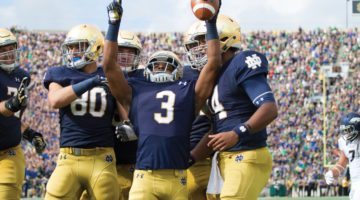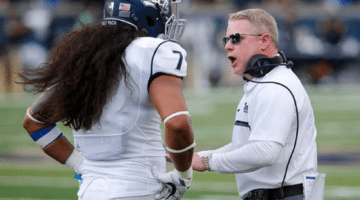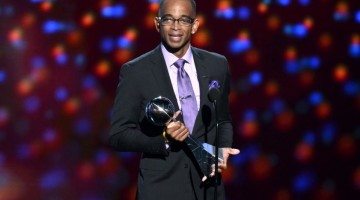by Jack Rieger
Bill Simmons is arguably the most outspoken personality in sports journalism. He views sports through the lens of a diehard Boston fan, which makes most traditional sports writers uncomfortable, but it’s the way Simmons has written since his college days at Holy Cross, before he was the most notorious sports critic in the world.
Simmons’ brand is blatant honesty, which has both enabled and limited his career. He was first noticed by ESPN in 2001, at the age of 31, when he wrote a satirical column criticizing the ESPYS award show hosted by ESPN. The company Simmons was poking fun at extended him an offer just a few months later, as he spent the next 14 years at ESPN writing columns, producing film series, hosting a variety of shows and finally, he created Grantland.com — the most elaborate project of his career.
Grantland was conceived from Bill Simmons’ ingenious brain as a “sports and pop culture website” that would serve as a creative division of ESPN.com. Simmons’ goal was to create a completely original website marketed to diehard, nerdy sports fans who wouldn’t mind reading a 10,000-word piece about the similarities between “The Fast and the Furious” movie series and the evolution of the triangle offense.
The site was met with tremendous success thanks to an all-star cast of writers, and ESPN’s wise decision to let Simmons run the site the way he wanted. Grantland had millions of visitors per day, and Simmons’ articles alone warranted over one million clicks per column. He developed a popular show called “The Grantland Basketball Hour” that competed for ratings with heavily financed basketball networks like TNT, ABC and even ESPN. But all of Grantland’s competitors lacked what made Simmons so polarizing: spontaneous emotion.
In 2013, Simmons fired shots at former Celtics coach Doc Rivers when he accused Rivers of quitting on the Celtics after Rivers went to the Clippers in the offseason. Rivers responded by saying, “I would like to call him an idiot, but I’m too classy for that.” Simmons responded to Rivers on live TV saying, “Just own it. Just admit what you did. The Celtics wanted to rebuild, you didn’t want to be a part of it, you wanted to go to the Clippers and it happened. Just own what you did.” Simmons and Rivers’ back and forth became the talk of the sports world for weeks.
Bill Simmons’ most publicized feud came in September of 2014, when he referred to NFL commissioner Roger Goodell as a liar on his podcast. Simmons was referencing the Ray Rice scandal, when running back Ray Rice was filmed punching his fiancee unconscious on an elevator security tape. Goodell, who only suspended Rice two games for the incident, claimed he never saw the video before it was leaked to the public and had no idea how severe it was. Simmons expressed his disapproval for Goodell’s explanation.
“If he didn’t know what was on that tape, he’s a liar,” said Simmons. “I’m just saying it. He is lying … And for all these people to pretend they didn’t know is such fucking bullshit … The commissioner’s a liar and I get to talk about that on my podcast. Please call me and say I’m in trouble. I dare you.”
ESPN responded by suspending Simmons for three weeks and released a statement explaining that Simmons didn’t live up to his “journalistic standards.” This was the beginning of the deterioration between Simmons and ESPN. While many people were upset with ESPN for punishing Simmons, it wasn’t surprising.
ESPN and the NFL are bigger partners than most fans realize. ESPN has contractual obligations with the NFL in many avenues, including the broadcasting rights for Monday Night Football, which ESPN bought from the NFL in 2011 for $15 billion. ESPN’s suspension of Simmons was about defending their most expensive partner, and showing ESPN writers this kind of criticism wouldn’t be tolerated.
In May of this year, ESPN released a statement explaining they wouldn’t be renewing Bill Simmons’ contract and that he would be relieved of his duties immediately. This wasn’t shocking considering Simmons’ increasingly rebellious behavior, and how costly it would be to bring back one of sports’ most popular personalities. The network then announced they would continue to own and operate Grantland without Simmons, a move that surprised many people, including Grantland’s staff of writers, who were relentlessly loyal to Bill considering he hired them himself.
Grantland was Simmons’ brainchild; he hired the staff, edited all content and most importantly, established the website’s spontaneous, open-minded energy. You can’t ax the ringleader and expect the culture to remain healthy. As an anonymous member of the Grantland staff said, “Bill is Grantland.”
Since Bill’s exit from ESPN in May, he signed a contract with HBO Sports and has created his own podcast, which operates as a vehicle for his spontaneous opinions about the sports world. And yes, he has taken several shots at his former employer, both verbally and tactically.
Last month, he managed to persuade four of Grantland’s top lead writers to come back to work for him on an unannounced project. Besides those four talented writers, dozens of other columnists, producers, web designers and countless other intricate members of the site have left for jobs with different publications.
Finally, on Friday afternoon, after five months of deterioration, ESPN announced they would be shutting down Grantland for good, along with the majority of the staff’s 40 contributors, many of whom found out about their termination on social media.
“Well, that’s the first time I’ve ever found out I was laid off via Twitter,” wrote Michael Baumann, a former Grantland columnist. The former ringleader himself chimed in via Twitter as well.
“I loved everyone I worked with at G and loved what we built,” Simmons tweeted. “Watching good/kind/talented people get treated so callously = simply appalling.”
ESPN is a $40 billion enterprise with an endless assembly line of writers and resources. Grantland’s termination won’t put a dent in their enormous profit margin, and ESPN will utilize their resources and attempt to find talented, young sports writers to replace the creative void Grantland and Bill Simmons left. But ESPN won’t find another Bill Simmons, just like they will never find another Grantland.
Jack Rieger can be reached at jrieger@sagebrush.unr.edu and on Twitter @JackRieger.













